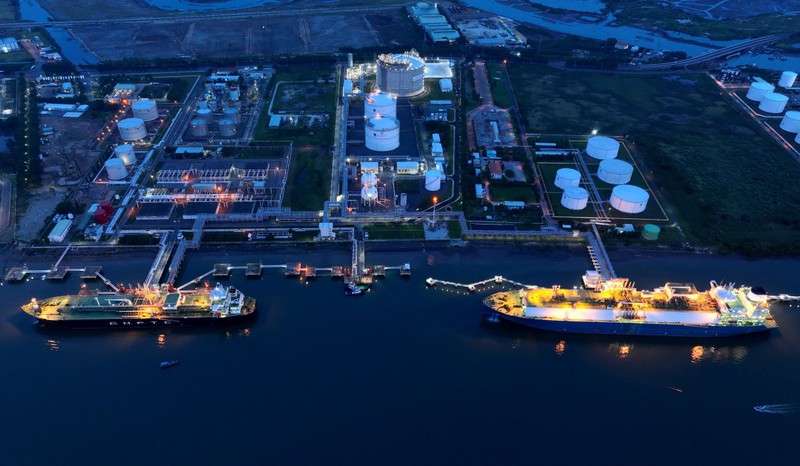
Intending to drive growth, PVGas has identified the focal tasks for the 2024-2025 period as business model transformation, focusing on market development to serve as a long-term growth driver.
Meeting consumer demand
In mid-March, PVGas officially began supplying LNG for industrial production while introducing an integrated business model, including liquefied petroleum gas (LPG)/compressed natural gas (CNG)/LNG. This event marked a crucial milestone for the enterprise in completing the LNG infrastructure in the southern region, including the import terminal, storage facility, regasification system, and pipeline network for supplying electricity, industrial customers, and tanker stations. With LNG products entering the market, the company has a comprehensive fuel gas product portfolio for industrial customers, including pipeline natural gas, CNG, LPG, and LNG. Additionally, PVGas will provide energy solutions for the market with diverse options, ensuring quality, supply, and competitive prices.
According to PVGas General Director Pham Van Phong, supplying LNG for industrial production is a significant milestone in the unit’s LNG value chain development process, fulfilling commitments to provide customers with greener, cleaner energy solutions in alignment with the government’s Net Zero commitments by 2050. This also meets the needs of industrial customers transitioning to green production to meet new international energy transition standards. “By offering an integrated energy solution package including dry gas, CNG, LPG, and LNG, the company ensures the provision of sustainable energy solutions, competitive prices, and various accompanying services, such as maintenance and infrastructure, thereby providing optimal choices and sustainable added value for customers,” affirmed Mr Pham Van Phong.
PVGas Deputy General Director Nguyen Cong Luan added that LNG is a superior energy source with outstanding advantages in energy efficiency, environmental friendliness, convenience in transportation, and supply. Therefore, the unit continues to invest in LNG value chain infrastructure to provide optimal energy solutions for the market. Notably, LNG distribution via tankers, ships, and railways will ensure a continuous, efficient, high-performance energy supply chain for PVGas partners, ensuring compliance with the unit’s gas market development strategy.
“In Vietnam, PVGas currently holds a 100% market share in dry gas and a 70% market share in LPG. To meet the gas demand for industrial production in Vietnam, the unit will commence Phase 2 of the Thi Vai LNG Warehouse with an increased capacity of three million tons per year, scheduled to be operational by 2026; launch the Central LNG Port Warehouse project in Son My, Binh Thuan, with a total capacity of six million tons per year, and implement LNG central port warehouse investment projects in the North and Central North regions. Additionally, the unit has established agreements with major LNG suppliers worldwide to ensure stable and competitive supply for the domestic market,” emphasised Mr. Nguyen Cong Luan.
Perfecting mechanisms and policies
PVGas General Director Pham Van Phong also stated that to achieve production and business goals, promptly put gas supply plans (LPG, LNG) in the North into operation, continue to actively participate in the international LPG, LNG trading market, and provide gas as raw material, the unit will continue to improve management, flexibly deploy solutions to promote production, business, and achieve growth targets. In addition, the unit will work with competent agencies to resolve policy and mechanism issues, especially policies and mechanisms for infrastructure investment and LNG consumption, as well as fees for invested pipelines. In the gas industry development strategy until 2030 and beyond, PVGas focuses on thoroughly implementing development strategies, diversifying markets and gas products, and investing in and developing LNG business as a growth driver. Specifically, the focus will be on supplying gas to gas-fired power plants; strong development, increasing the proportion of gas consumption outside of electricity with the goal of industrial and transportation customer growth of 10% per year; enhancing international LPG, LNG business activities to maintain a 70% market share in domestic LPG business, and international business of over one million tons per year. Additionally, PVGas plans to participate in providing LPG as a raw material for the oil refining sector; developing services based on advantages (transportation, storage; leasing port infrastructure, pipelines, warehouses; consultancy, maintenance, and maintenance services); research, experiment, and introduce hydrogen blending into gas for household consumption; leveraging cold energy for gas production and industrial gas business development.
Assessing the market outlook in the coming time, PVGas General Director Pham Van Phong acknowledges that the unit must face many difficulties and challenges, especially the rapid decline in domestic gas sources, reduced gas demand from electricity and industrial consumers, instability due to energy transition trends, declining coal prices, and economic difficulties and the LNG supply to new consumer households has not yet been implemented.However, with the focus of the 2024-2025 period on business model transformation, the unit will focus on developing the market as a long-term growth driver, providing impetus for enterprises to overcome difficulties and achieve set goals.
Reflecting on the company’s activities, PVN Chairman Le Manh Hung noted that PVGas needs to focus on resolving policy and mechanism obstacles, promoting domestic market development and international trade development in line with PVN’s ecosystem as a driving force for strategy implementation, focusing on developing related services such as storage, transportation, infrastructure business, forming a sharing economy model; building a supply chain security strategy; optimising production, replicating efficient models, and experimenting with new models; promoting research and development, digital transformation, and innovation to drive enterprise development.
Hoang Anh





